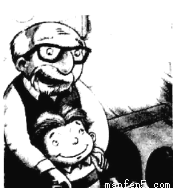WHICH FAMOUS PERSON IN HISTORY WOULD YOU LIKE TO HAVE MET AND WHY?
For me it would clcarly be Leonardo da Vinci, I’d love to have met him. He was such a creative talent and not just an artist. He seems to have predicted a number of inventions that only came about hundreds of years later, like flying machines and so on. I’s like to tell him he really did see the future. Naomi, Chicago |
I’d choose Cleopatra—the last king of ancient Egypt(埃及). She is thought to have been very beautiful and is generally considered to have developed some really useful political alliances (政治同盟). Not many women were that powerful in ancient times, I’d like to have seen how she did it. Lucinda, Nairobi |
I’m Latin American, so I would name Simon Bolivar as the person I would like to have known. He’s supposed to have been a very great, brave leader'and is accepted to have helped achieve independence for several countries in Latin America in the nineteenth century. Patricia, Caracas |
I studied philosophy(哲学) , so I would like to have spoken face-to-face with the Chinese philosopher donfucius. I’d like to have discussed with him his political philosophy and his idea about family values. He seems to have had a lot of respect for older people, and even though he lived over two thousand years’ ago, some of his opinions are still meaningful. Li Yun, Shanghai |
1.Whose ideas about inventions have come true?
A. Leonardo da Vinci’s. B. Cleopatra’s. C. Simon Bolivar’s. D. Confucius’.
2.Which of the following is TRUE from the passage?
A. Leonardo da Vinci invented a flying machine hundreds of years ago.
B. Lucinda would like to have met Cleopatra because she was pretty.
C. Simon Bolivar was a person who encouraged independence of women.
D. Li Yun would like to have talked with Confucius about his family values.
3.In which part of a magazine can we read the passage?
A. Art. B. Movie C. History. D. Technology.
假如你是Greenhill School的交换生,你参与了该校的一个科学实验。请根据以下实验过程补全英文实验报告。
Water in Motion | ||||||||||
What You Need: •clear glass tray •warm water •large cup with 200 ml of hot water •large cup with 200 ml of cold water •red and blue liqpid food coloring
| Directions : ① Fill the tray with warm water. ② Set the tray on top of the two cups, with the hot cup under one end and the cold cup under the other. ③ Add four drops of red food coloring to the water above the hot cup and four drops of blue food coloring to the water above the cold cup. Add both colors at the same time. Results :
|
Hello, everybody. Here is our report on the experiment “1.”. First, we put the glass tray full of warm water on top of two cups with 200 ml of2.water and cold water. Then, we add red and blue liquid food colorings into the water above the hot and cold cups. at the same time.
After careful observations, we got the3.. The blue food liquid coloring moves downward first and then to the hot side while the 4.one spreads quickly and covers whole top in a short time and goes down; the blue liquid food coloring spreads more5.than the red one. Thank you for listening.





